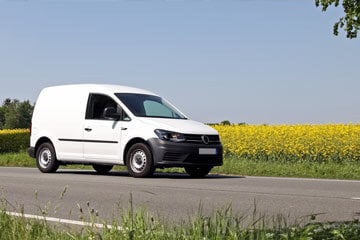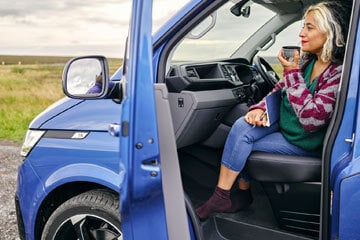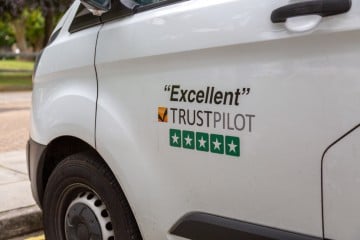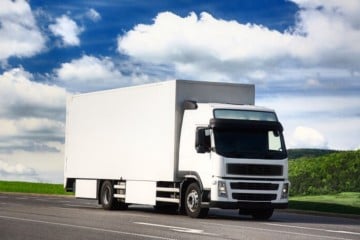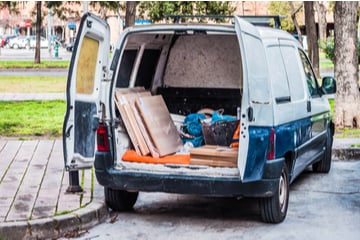Tractors and agricultural vehicles are more than mere machinery. As a farmer, you'll know these play a critical role in managing your farm and supporting your livelihood. As such, it's important to have the right insurance in place to be sure you're financially protected. But also at the right price.

What is tractor and agricultural vehicle insurance?
We don’t compare tractor or farm vehicle insurance at Confused.com, but this guide’s here to help you find the right cover if you need it.
Tractor and agricultural vehicle insurance is designed to protect your vehicles, whether you have a smallholding with a single 4x4, or a large farm with multiple machines.
Having a policy in place gives you a financial safety net in case they're stolen, damaged by attempted theft or ruined in a fire. It can also protect you and others if your vehicles are involved in an accident.
Tractor
Having tractor insurance is a legal requirement if you're taking your tractor out on public roads. But being covered can also give you peace of mind that you're protected for any incidents your tractor might be involved in. Whether you're on private land or out running jobs.
Depending on your policy, you may be able to get protection for goods you're carrying up to a certain limit. Your insurance might cover attachments such as trailers, or jobs including tree felling and haulage too.
Agricultural vehicles
Some agricultural vehicles such as vans or pick-ups could be covered by a van insurance policy, especially if you mainly use them on the road. If you use your van commercially, a business van insurance policy might work for you too.
But if you have an assortment of farm vehicles - such as combine harvesters, diggers, tipper vans, quad bikes and 4x4s - it might be worth looking to cover them under one policy. This way, you'll save on admin by having only one renewal date, and might save money on your insurance to boot.
Why do you need tractor and agricultural vehicle insurance?
Having insurance is a legal requirement for any motor vehicles which are driven on public roads. But getting the right cover can benefit you even if your vehicles stay on your farm or smallholding.
Tractor and agricultural vehicle insurance is important for protecting your investment. Your policy can help you recover from financial loss if your vehicles or machinery are stolen, for example. Or if they're damaged by things like fire, flooding or an accident.
It can also protect you if you're involved in an incident involving a third party. Having insurance shields you from being liable for costs if you accidentally injure someone or damage their property.
Who needs farm vehicle insurance?
This type of insurance can potentially benefit all farmers and landowners. It's worth considering, even if your vehicles are limited to your own land.
One thing worth bearing in mind is whether your business would be disrupted if a vehicle was damaged, stolen or otherwise put out of action. If the answer's 'yes', then it's a good idea to look into cover, to keep the farm running smoothly.
Please note that these policies only cover vehicles. You'll need a separate agricultural or farm insurance policy if you want to protect your farmhouse, any outbuildings, contents, horses or livestock.
Types of tractor or agricultural vehicle insurance?
The level of farm vehicle insurance you need depends on your particular requirements and circumstances. Think about what you need to be covered for, whether the vehicles are driven on public roads, and what they're used for.
When considering how to choose the right tractor or agricultural insurance for you, there are 3 different levels of cover to weigh up:
- Third-party only. This only covers injury to other people, or damage to their property. It's a fairly basic level of cover, and won't protect you for damage to your own vehicles.
- Third-party, fire and theft. This protects you against claims from third parties, but also covers your vehicles in the event of damage or loss due to fire, attempted theft or if they're stolen.
- Comprehensive. A fully comprehensive policy covers all the above, but can also protect your vehicle if it's damaged in an accident, vandalised, or if you're injured while using your vehicle.
What does tractor and agricultural insurance cover?
If you're thinking about buying a policy, it's important to know what's covered. And - just as importantly - what isn't.
What's covered?
Cover varies between providers, so it's always worth checking the policy document before you commit. But generally speaking, insurance can cover:
- Damage, loss or theft of the vehicle
- Trailers, attachments and implements
- Goods you're vehicle or trailer is carrying
- Personal accident cover, if you're injured while operating the vehicle
- Windscreen or glass damage
- Legal liability for injuring others, or damaging their property
There will usually be limits for how much you can claim for certain events, so it's worth checking this too.
If you're a hobbyist or take your tractor to agricultural shows, it's also possible to get cover for vintage tractors. Cover is usually for vehicles over 25 years old, and offers different protection given its usage.
What's not covered?
Again, check your policy, but these are standard tractor insurance exclusions:
- Internal damage to machinery caused by a material it's designed to process
- Electrical, mechanical or computer failure
- Depreciation
- Normal wear and tear
- Damage to tyres
- Damage or theft due to not taking reasonable care
What affects the cost of tractor insurance?
Numerous factors come into play when insurers calculate the cost of your premiums. Your insurer considers these things before giving you a price:
- Age and location. Younger drivers typically have higher premiums. Your location affects the price too. The greater the incidence of accidents or theft in the area, the more costly it's likely to be.
- Driver history. If you have a long, clean driving history, you're likely to be considered lower risk.
- Value of the vehicle(s). More expensive vehicles with parts that cost more to replace will increase the cost of cover.
- Security. How safely you store your tractor or vehicle will have an impact on your insurance cost. Likewise any security features the tractor or vehicles have.
- Type of insurance. The level of cover (see above) that you opt for has a bearing on the price. But be sure to compare different types before you commit, as sometimes comprehensive cover may work out cheaper.
We don't offer farm vehilce insurance but running a quote is a great way to see how much tractor insurance is for you.
How can I get cheaper insurance?
There are some factors which you can't change. But you could get cheaper tractor insurance by doing the following:
- Increase your voluntary excess. Upping your excess - the amount you pay if you need to make a claim - could lead to cheaper premiums. But don't set this at a level you couldn't afford to pay if you need to make a claim.
- Add drivers with experience. As mentioned, younger drivers may be hit with more expensive premiums. But adding an experienced named driver to the policy could help to drive down the price.
- Keep an eye on the market value. Your tractor's market value will also influence how much you pay. Double-check this before you renew your policy, to make sure it's not overvalued, and you're not paying too much.
How to choose the right tractor or agricultural insurance for you?
How can I improve tractor security?
Another way to keep your insurance price down - and save yourself some heartache - is to make sure your tractor or vehicles are safe and secure. Here are a few ways to deter potential thieves:
- Register your vehicle with the Driver and Vehicle Licensing Agency (DVLA).
- Install a Thatcham-approved security device, such as an alarm, immobiliser or tracker.
- Lock your tractor and never leave the keys in the ignition - no matter how remote your farm is.
- Get security markings for parts. This will make them harder for thieves to sell on, and easier to recover.
Install a security system in your farm or smallholding, such as CCTV.
How to file a claim for your tractor insurance?
If something happens to your tractor or agricultural vehicle, meaning you need to make a claim, these are the steps to take:
- Locate your policy documents. Before contacting your insurer, dig up your documents and policy number.
- Take photos. You may be able to speed things up by providing photo evidence, such as of equipment damage or signs of theft.
- Contact your insurance provider. You may be able to contact them via app, online chat or by phone.
- Explain what happened. It's helpful to be as accurate as possible, providing times and any relevant details.
- Provide other evidence. In addition to photos, you may be asked to supply evidence like receipts, or bills for repairs. You can normally do this digitally. But if you do need to send any evidence by post, make sure you keep copies.
While it's always best to inform your insurance provider of any incident quickly, be sure to gather everything you need first. If you're organised and accurate, this may help to speed you your claim, and get you back in business as quickly as possible.
FAQs
Can you insure a vintage tractor?
Yes, it's possible to get insurance for a vintage or classic tractor. There are specialist insurance providers that cover tractors aged 25 years and over.
When you apply for vintage tractor insurance, be sure to tell your insurance provider what it's used for - for instance rallies or farm shows. If you hire it out for weddings or events, you may need hire and reward cover.
Can you insure a fleet of agricultural vehicles?
Yes. If you have several agricultural vehicles, it's usually possible to insure them with a single fleet policy. This means you only have one renewal date to remember each year, and may well work out cheaper than buying multiple individual policies.
It may be possible to mix and match vehicles too, such as:
- Tractors
- Diggers
- Tipper trucks
- 4x4s (farm car insurance)
- Combine harvesters
- Quad bikes
If you're buying a fleet policy for your agricultural vehicles, be sure to check if there's a limit as to how many can go on one policy.
Do tractors need an MOT?
While it's always a good idea to keep tractors in roadworthy condition, those that are used for agriculture, forestry and horticulture are exempt from needing an MOT.
It's always worth keeping it in good nick though. This way you can make sure it's safe, and hopefully keep it from breaking down, so saving on repair costs.
Do you need insurance to tax a tractor?
No, they do not need to be insured to tax them - you just need to send your registration documents to the DVLA. If you want to register your vehicle but it's kept on private land, you may need to declare it SORN.
Some vehicles used for agriculture, forestry and horticulture may not even need to be taxed. If you drive your tractor on a public road no more than 9.7km a week - not exceeding 1.5km in any one journey - you could be exempt. For more information, check the agricultural vehicle licences, tax information and fuel page at GOV.UK.
Compare cheap van insurance quotes
Get a quote

